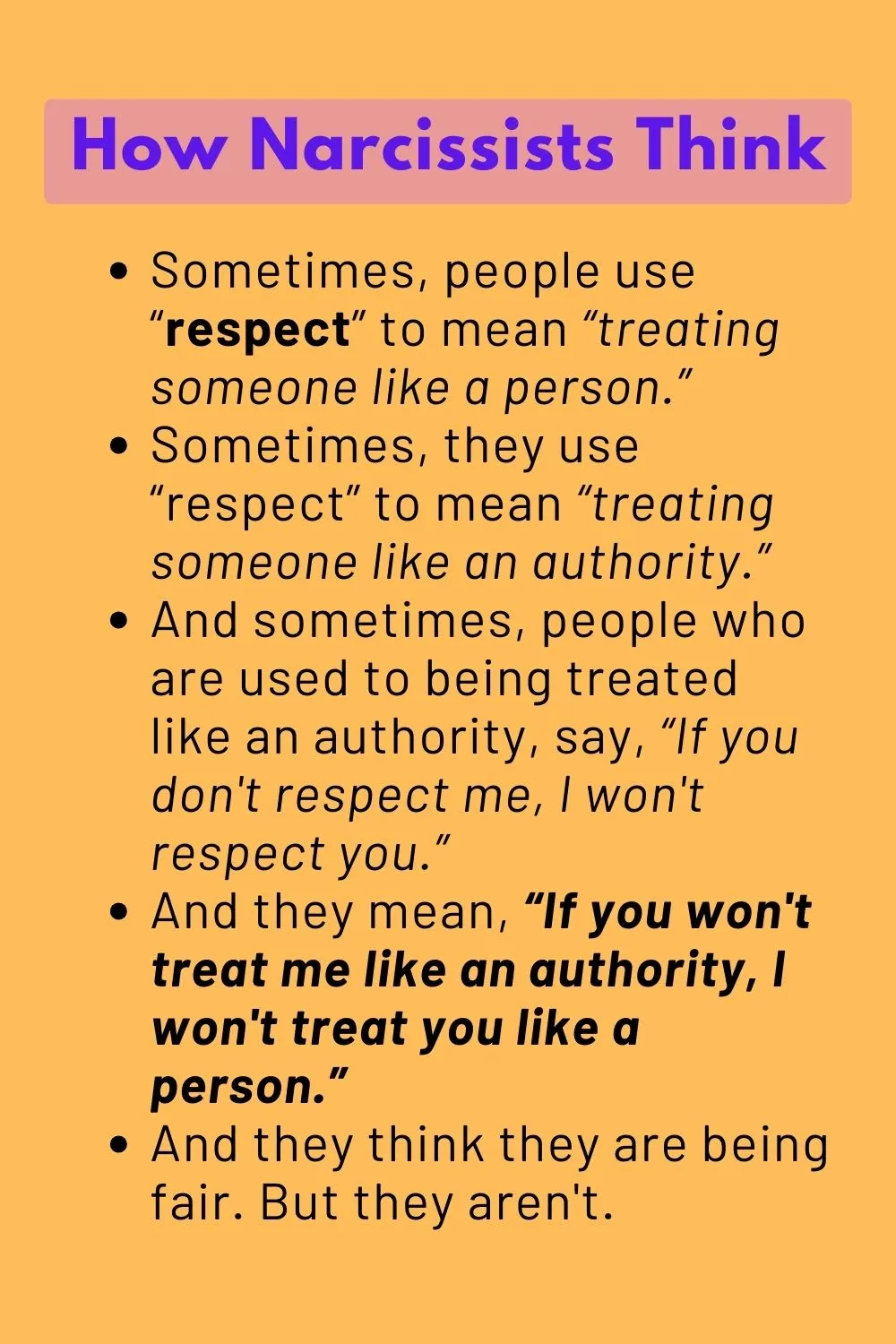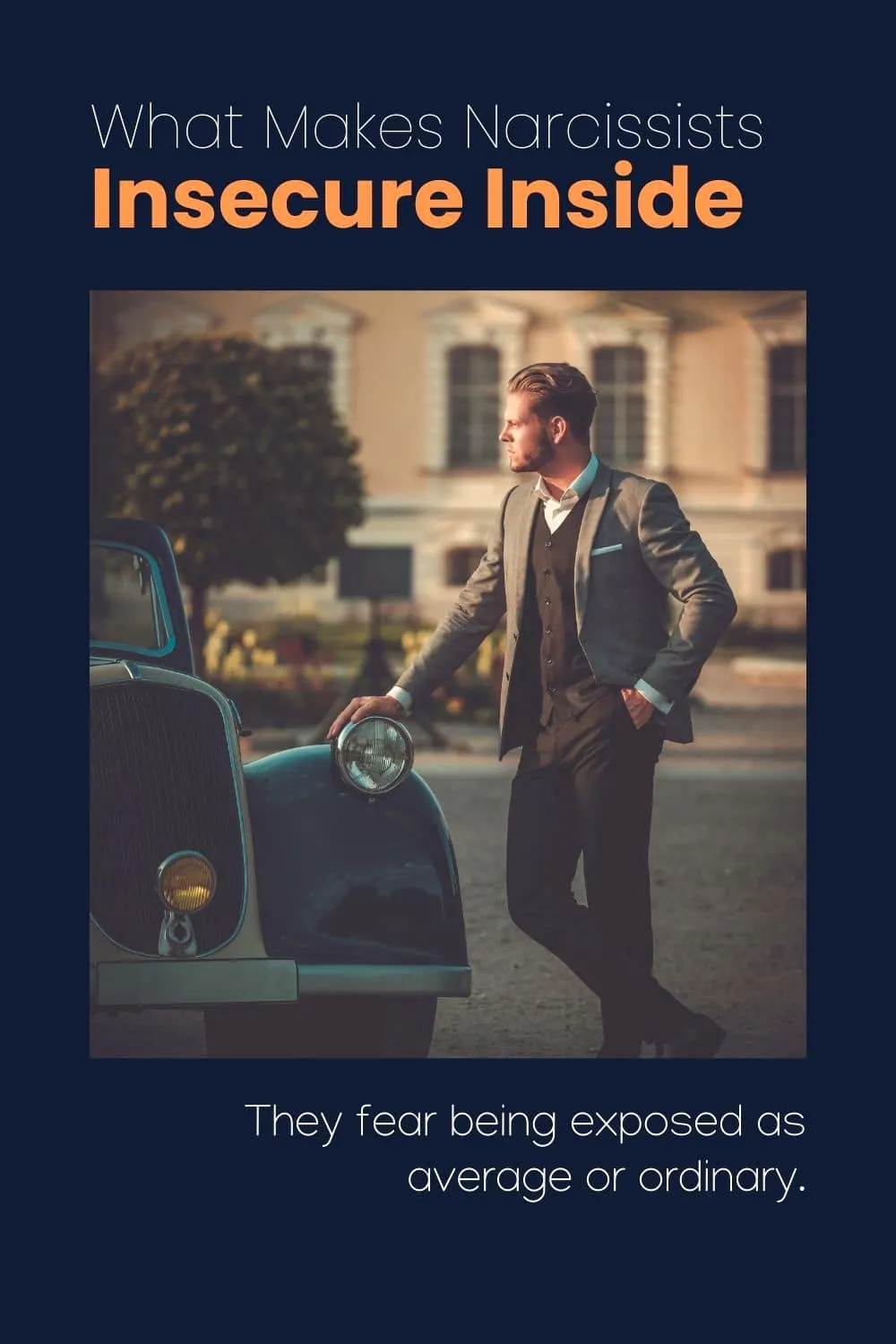Today's Saturday • 6 mins read
Narcissists often look confident and stylish. They know how to appear calm and in control.
However, beneath the surface, many of them feel deeply insecure. Knowing this helps explain their self-centered and manipulative behavior, often seen as red flags of narcissism.
Are Narcissists Insecure?
Yes. Many narcissists hide feelings of inadequacy behind a grand image.
Their insecurity fuels a constant need for praise, attention, and control. They work hard to protect a fragile self-image and avoid facing their vulnerability.
Narcissists have low self-worth, which makes them intrinsically insecure. But they often mask it with high self-esteem, which is unstable, as it heavily depends on other people validating them.
- Narcissism is driven by a compensatory adaptation to hide their low self-worth.
- They fear being exposed as average or ordinary, contradicting the grand image they project.
- They believe they might be perceived as weak if they don’t assert their authority to dominate others.
Many narcissists struggle with insecurity, self-doubt, and low self-esteem. This also makes them slow to seek help. A narcissist’s low self-esteem can explain the strange patterns in their relationships.
“A narcissist’s low self-esteem may explain the odd patterns of behavior in their relationships.”
10 Reasons Why Narcissists Are Insecure In Life
Here are 10 reasons why narcissists are insecure:
1. Need for Validation and Admiration
Narcissists often need constant praise. This comes from deep insecurity and low self-esteem. They talk about their wins and steer conversations back to themselves to feel worthy.
They may exaggerate talents to seem impressive. If that fails, they might take credit, spin stories, or form shallow ties where they feel admired.
When others get the praise they want, they can feel threatened and jealous. To protect their status, they may belittle others or tear them down.
2. Fear of Criticism or Rejection
Criticism feels like an assault on their “perfect” image. Even small feedback can sting. They try to control people and situations to avoid feeling exposed.
This fear can lead to stress, anxiety, and depression. When challenged, they may react with anger or defensiveness, often called narcissistic rage.
They may also pressure others to praise and respect them. It’s a way to boost their shaky self-esteem and keep up their image.
Narcissists also fear being exposed for their true selves. They often present a false image of themselves to others, projecting an idealized version of themselves. Their fear is about being found out as something they are not

3. Unstable Self-Image
Their identity depends on other people’s approval. They compare themselves with others and hide any sign of weakness. Inside, they know their self-esteem is fragile.
They fear being exposed as flawed. So they try to control others to keep their shortcomings unseen.
“I criticize myself because it hurts less when I do it than when others do.” is one of their common thoughts.
Past neglect, abuse, or pressure to achieve can feed this unstable self-image. These roots create unhealthy coping and a need to succeed at any cost.

4. Sense of Entitlement
They believe they deserve special treatment. When things don’t go their way, they feel wronged. This increases their insecurity.
Entitlement makes them act without regard for others. It harms relationships and drives people away. Over time, this creates more rejection and loneliness.
The superior pose often hides shame and insecurity. They put others down to avoid facing their own fears.

5. Difficulty with Empathy
Empathy means understanding others’ feelings. Many narcissists struggle with this. They focus on their own needs and miss key emotional cues.
This weakens closeness and trust. They may have cognitive empathy—reading what others feel—but use it to influence, not to care.
That gap creates distance in relationships. The distance then feeds more insecurity and a need for control.
From the early clinical conceptualizations of narcissistic personality disorder (NPD) to the introduction of NPD in the DSM–III (APA, 1980), impaired empathic processing has been considered a hallmark of pathological narcissism and NPD. Most often, “lack of empathy” is included as a signifier of the diagnosis and is highlighted in both the clinician’s and lay public’s impression of narcissistic individuals.
— Baskin-Sommers, Krusemark, and Ronningstam, Empathy in Narcissistic Personality Disorder, 2014.
6. Envy and Competitiveness
They compare themselves to others all the time. Achievements, relationships, and status can trigger envy. They fear being outshined.
This can lead to gossip, gaslighting, or sabotage. These moves keep control for a while but grow their fear of exposure.
Over time, envy can make them avoid peers. They worry every meeting might lower their status or spark fresh jealousy.
7. Subtle Insecurity Under Grandiosity
Grand displays often hide low self-worth. Boasting and “flexing” help cover self-doubt and anxiety.
People with narcissistic traits rely on outside praise to feel good. They may post flashy wins or take endless selfies to prop up their image.
The louder the show, the deeper the insecurity can be. Seeing this helps explain their motives and protects against being swayed.
A study by Kowalchyk & Palmieri suggests narcissism is driven more by insecurity than an inflated sense of self.
Narcissism is better seen as a compensating adaptation to overcome and hide low self-worth. It explains why narcissists engage in negative behaviors like self-congratulation or ‘flexing’ that makes others think less of them.
8. Fragile Personal Relationships
Self-focus and manipulation strain bonds. Loved ones feel used for praise and validation. Conflicts and misunderstandings pile up.
Jealousy and quick hurt further weaken support. Breakups then raise insecurity and the urge to control even more.
This cycle makes stable, healthy connections hard to keep.
9. Manipulative Tendencies
Manipulation helps them keep power and attention. Common tactics include gaslighting, guilt-tripping, and playing the victim.
Gaslighting makes targets doubt their own mind. Guilt-tripping pushes people to give in. Playing the victim wins sympathy and control.
These tactics protect a weak ego and a polished image. But they also isolate the narcissist and block real trust.
10. Obsession with Maintaining Control
Control hides flaws and keeps up a superior front. They may demand praise, set strict rules, or use emotional pressure.
They fixate on looks, status, and possessions to manage how others see them. This distracts from the insecurity underneath.
In relationships, they may become possessive and isolating. They try to dictate choices and keep the upper hand, driven by fear of rejection and exposure.
Final Words
A narcissist is like a beautiful vase that is mostly empty, quite fragile, and extremely likely to shatter under scrutiny or criticism.
Their obsession with hiding their underlying insecurities is the reason they present themselves as superior people. Take a double look before you get floored by them.
• • •
√ Also Read: 7 Signs of A Female Narcissist: The Dark Narcissist-Woman
√ Please share this if you found it helpful.
» You deserve happiness! Choosing therapy could be your best decision.
...
• Disclosure: Buying via our links earns us a small commission.